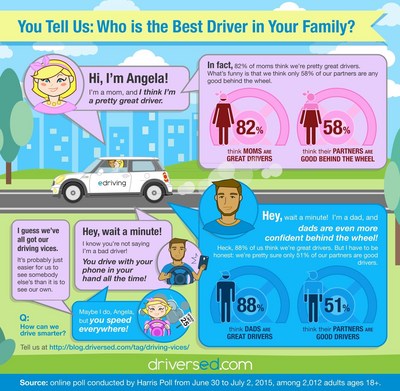Who's the Best Driver? Survey Finds Our Spouses Think Less of Us Than We Do - And They May Just Be Right!
 |
eDriving Warns of Over-Confidence on Road and Encourages Parents to Communicate More and Take Greater Control over Driving
OAKLAND, CA -- Sept. 3, 2015: Nearly twice as many people think they're "very good" drivers as think the same of their spouses and significant others. Fully 85% of adults think they are very/fairly good drivers, 61% of whom rate themselves as "very good", according to a recent poll. However, most don't believe the same of other family members. In fact, only 33% of adults grade their spouses/significant others as "very good" drivers.
The findings come from an online survey conducted by Harris Poll on behalf of eDriving, LLC of 2,012 adults in the United States.
Specifically, the poll indicates that self-evaluations just don't match the verdicts of the observers who see the most and know the best:
When rating themselves and close family members on their driving skills, 85% of U.S. adults consider themselves to be very/fairly good drivers. As highly as they think of their own driving, they don't seem to share these feelings about others:
Only one in three rate their spouse/significant other as very good: 25% of men, and 41% of women.
Just one in three adults think their child is a fairly/very good driver.
Barely anyone admits to being a bad driver, or even not very good: just 2% of people own up to this.
"The discrepancies here point out an interesting and important truth: most drivers are over-confident, and the people who drive with them the most are probably very aware of their bad habits behind the wheel," emphasized Celia Stokes, CEO of eDriving.
"All of us who drive know that the drivers around us have more than their share of driving vices, but we may be blind to our own!" continued Ms. Stokes. "We recently conducted focus groups, in fact, and found that many parents we talked to were confident that they could teach their children to drive without any additional instruction, guidance, or lessons. Interestingly enough, the kids we talked to didn't always agree."
However, a child will have spent countless hours observing a parent drive tens of thousands of miles by the time they're old enough to get a license. They witness their parents' reactions to trouble and traffic, how careful they are to signal, whether they always think the rules apply to them, and whether they speed, tailgate, text, or tweet. "Parents must remember that they are really their children's first driving instructor. If they want their children to be better drivers, they must model better behavior and raise the bar when it comes to driving skill," advises Hale Gammill, an eDriving director of behind-the-wheel instruction and driving school industry leader since 1968. "And that starts with knowing what they're doing wrong. Raising a good driver is not about avoidance, it's about active practice and conscious and continuous learning. Finding out what your passengers think you're doing wrong is a great first step," Mr. Gammill, who has received industry awards for leadership and outstanding achievement, added.
"eDriving wants the same thing parents want: the best, safest experience on the road. But hope is not a strategy and existing courses are not sufficient. With integrated online and in-car packages, carefully targeted supplementary lessons that go beyond the DMV requirements, and a commitment to driving as a life-long practice that changes from young drivers, to seasoned and mature practitioners, to the challenges of age, we aim to help set and deliver a new standard of personal control behind the wheel," continued Stokes. "But it really all starts at home, with clear feedback about what we are doing well, and what we are doing badly, and a sense of active personal accountability. We all have our driving vices – they seem to be clear to everyone else in the car. We need to own up to them before passing them along to our kids."


